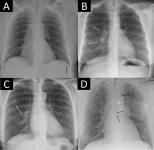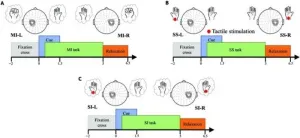(Press-News.org) INDIANAPOLIS – A new study examining older Black Americans’ perceptions of Alzheimer’s disease has found a lack of awareness of the devastating condition. The authors propose strategies for supporting brain health in this population.
Absence of awareness of Alzheimer's disease may undermine Black Americans’ ability to identify potential risk of the disease and its impact on their community, said Johanne Eliacin, PhD, Regenstrief Institute, U.S. Department of Veterans Affairs and the Indiana University School of Medicine research scientist and study leader. Dr. Eliacin notes that the research team’s findings may contribute to the development of effective and culturally sensitive strategies to address racial disparities in Alzheimer’s disease.
“We asked study participants whether they agree, disagree or are unsure that Black Americans are at higher risk of developing Alzheimer's disease compared to White Americans, and most were unsure. Yet Black Americans are at greater risk of developing Alzheimer's disease than White Americans,” said Dr. Eliacin. “And when Black Americans are diagnosed, they often have a greater burden because of the costs of managing the illness, lack of available support for patient and caregiver and all of the challenges of navigating the healthcare system for this very complex illness. Combined with socio-cultural determinants of health, many Black Americans are really disadvantaged when it comes to dealing with Alzheimer’s disease. We still have a lot of work to do.”
“I don’t think too many [people] really think about it as much unless it hits them personally…some Black people look at it like mental illness, [it] is taboo,” said one study participant.
Another observed, “I think that there’s whispers about it…. But I don’t think it’s well-known and I don’t think it’s known as how truly dangerous it is. …the Black community doesn’t fully understand I think the implication. Not like cancer.”
A third said, “People come into our community and are clueless about who we are and what we’re all about. And have not made any effort in learning about our community, but only relying on what the media has put in front of them as this is what the African American community should look like. And, if that’s your only source about the African American community, you are extremely ignorant. Well, you need to know that you…to overcome years and years of a group of people being taken advantage of in all different ways. For instance, are you familiar with the wealth gap?…education gap?…the health gap?…social justice issues. …And if you have a problem with those things, you’re not gonna do well within an African American environment, because it’s gonna show.”
To promote a healthy brain, 72 percent of female study participants versus 59 percent of male participants reported engaging in mental activity -- for example doing puzzles -- and 75 percent of all participants reported practicing a healthy lifestyle.
“The Black Americans we surveyed and interviewed see themselves as playing an important role in keeping themselves healthy and supporting healthy aging. They want to do more and they want to have the tools to do so,” said Dr. Eliacin. “They are ready to play a role, but they need more education in terms of the breadth of activities that could help support a healthy brain. They also need additional support to facilitate access to resources so that they can engage in more activities for healthy brain support.
“They are eager to learn, but for messages on brain health to be well received and to have the biggest impact possible, we need to increase representation of minoritized groups in research and Black American community members have to be part of the decision-making process and the development of outreach programs.”
Based on study participants’ perceptions, the research team proposed strategies to promote brain health and to increase Alzheimer’s disease awareness among Black Americans:
Invest in the Black community’s well-being throughout the lifespan.
Proactively reach out to the Black community.
Integrate information about Alzheimer’s disease and brain health into broader culturally appropriate wellness campaigns.
Improve health, healthcare and research equity.
The study is one of the first to provide insight into the views on brain health of lower socioeconomic status Black Americans living in a Midwest metropolitan area, a population often neglected or absent from clinical trials for Alzheimer’s and other diseases. Dr. Eliacin notes that while there are many insights that can be drawn from this work that could be applicable to others, there is need for a large national study.
“Our study underscores the importance of developing culturally sensitive approaches that provide meaningful learning experiences about Alzheimer's disease and brain health for Black Americans,” said study author Sophia Wang, M.D., of the Indiana University School of Medicine. “The self-reported differences in Black women and men participating in healthy lifestyles also highlight other sociodemographic factors, such as gender, that should be considered as well as we develop and test approaches.”
“Black Americans’ perceptions of Alzheimer’s disease, a healthy brain, and strategies for brain health promotion” is published in the peer reviewed journal PEC Innovation.
This research was supported by National Institutes of Health’s National Institute on Aging grants P30 AG10133 and P30 AG072976 to Andrew J. Saykin, PsyD. Dr. Eliacin received support for this work from a Veterans Health Administration Health Services Research and Development Career Development Award [16-153], and an Academy of Communication in Health Putnam Scholar Fellowship.
Authors and affiliations:
Johanne Eliacina,b,c,d,e, Angelina Polsinellie,j, Kenzie A. Cameronf, Andrew J. Sayking,h,i, Sophia Wange,g.
aNational Center for PTSD, Boston VA Healthcare System, 150 South Huntington Street, Boston, MA 02130, USA
bVA HSR&D Center for Health Information and Communication, Richard L. Roudebush VA Medical Center, 1481 West 10th Street, Indianapolis, IN 46202, USA
cRegenstrief Institute, 1101 West 10th Street, Indianapolis, IN 46202, USA
dDepartment of General Internal Medicine and Geriatrics, Indiana University School of Medicine, 340 West 10th Street, Fairbanks Hall, Suite 6200, Indianapolis, IN 46202-3082, USA
eAlzheimer’s Disease Research Center, Indiana University School of Medicine, 355 West 16th Street, Goodman Hall, Suite 4100, Indianapolis, IN 46202, USA
fDepartment of Medicine, Division of General Internal Medicine, Northwestern University, Feinberg School of Medicine, 750 N. Lake Shore Drive, 10th Floor, Chicago, IL 60611, USA
gDepartment of Psychiatry, Indiana University School of Medicine, 340 West 10th Street, Fairbanks Hall, Suite 6200, Indianapolis, IN 46202, USA
hCenter for Neuroimaging, Department of Radiology and Imaging Sciences, Indiana University School of Medicine, 550 North University Blvd. Room 0663, Indianapolis, IN 46202, USA
iDepartment of Medical and Molecular Genetics, Indiana University School of Medicine, 410 West 10th Street, HITS Building 4000, Indianapolis, IN 46202 USA
jDepartment of Neurology, Indiana University School of Medicine. 355 W 16th Street, Suite 4700, Indianapolis, IN 46202 USA
Johanne Eliacin, PhD
In addition to being a research scientist with the William M. Tierney Center for Health Services Research at Regenstrief Institute, Johanne Eliacin, PhD, is a research scientist at the VA National Center for PTSD, Women’s Health Sciences Division, Boston VA Healthcare System and the Center for Health Information and Communication at the Richard L. Roudebush VA Medical Center. She is also an assistant research professor of medicine at the Indiana University School of Medicine.
END
Black Americans at greater Alzheimer’s risk and treatment burden, less awareness of disease and symptoms
Researchers propose strategies to support brain health in this community
2024-08-20
ELSE PRESS RELEASES FROM THIS DATE:
AI can help rule out abnormal pathology on chest x-rays
2024-08-20
OAK BROOK, Ill. – A commercial artificial intelligence (AI) tool used off-label was effective at excluding pathology and had equal or lower rates of critical misses on chest X-ray than radiologists, according to a study published today in Radiology, a journal of the Radiological Society of North America (RSNA).
Recent developments in AI have sparked a growing interest in computer-assisted diagnosis, partly motivated by the increasing workload faced by radiology departments, the global shortage of radiologists and the potential for burnout in the field. Radiology practices have a high volume of unremarkable ...
Recent developments of vaccines as a precision medicine approach to cancer immunotherapy
2024-08-20
The field of precision medicine, especially in the context of cancer immunotherapy, has seen significant advancements in recent years. Precision medicine tailors treatment to the unique genetic and molecular profile of each patient, moving away from conventional one-size-fits-all approaches. This personalized strategy aims to minimize side effects and maximize therapeutic efficacy. A key component of this approach is the use of immune checkpoint inhibitors (ICIs), monoclonal antibodies that target immunosuppressive molecules such as PD-1, PD-L1, and CTLA-4. These ICIs have demonstrated considerable ...
Enhancing brain-computer interface performance through tactile and motor imagery: A revolutionary EEG study
2024-08-20
In a groundbreaking study recently published, researchers from Zhejiang University have unveiled significant findings that could enhance brain-computer interface (BCI) technologies, marking a crucial step towards more intuitive neuroprosthetic control and advanced rehabilitation therapies. The study, titled "Neural Correlates of Motor/Tactile Imagery and Tactile Sensation in a BCI paradigm: A High-Density EEG Source Imaging Study," employed high-density electroencephalogram (EEG) recordings to delve into the neural dynamics of motor and ...
Inhaler misuse leads to mismanagement of COPD symptoms, increased exacerbations
2024-08-20
MIAMI (August 20, 2024) – Inhaler misuse leading to inadequate medication delivery impacts a person’s ability to manage symptoms of chronic obstructive pulmonary disease (COPD), and additional education about proper inhaler use is needed to improve health outcomes, according to two new articles. The articles are published in the July 2024 issue of Chronic Obstructive Pulmonary Diseases: Journal of the COPD Foundation, a peer-reviewed, open-access journal.
COPD comprises several conditions, including chronic bronchitis and emphysema, and can be caused by irritants like smoke or pollution and genetics. The disease affects more than 30 ...
Growth from adversity: How older adults bounced back from the COVID-19 pandemic
2024-08-20
During a pandemic, attention is usually focused on the immediate challenges, such as managing the disease, ensuring safety and coping with disruptions in daily routines. Adversity, while difficult, can sometimes lead to positive effects.
For older adults living in retirement communities, there has been limited research on how the COVID-19 pandemic and its regulatory measures affected them. Additionally, there is scant research on any potential positive effects for this population.
Now, a new study of 98 older adults (median age 86 years) living in a continuing care retirement community in South Florida during COVID-19 reveals ...
The University of Texas at San Antonio tackles research security threats with $67 million NSF grant
2024-08-20
UTSA will partner with Texas A&M University to co-lead SECURE Southwest, one of five new regional centers being launched to strengthen U.S. research security.
Under a five-year, $67 million award from the National Science Foundation (NSF), the Safeguarding the Entire Community of the U.S. Research Ecosystem (SECURE) Center aims to strengthen intellectual property and research security by educating members of the research community about security issues and engaging them in a process of collaborative problem-solving.
The ...
Computer scientists discover vulnerabilities in a popular security protocol
2024-08-20
A widely used security protocol that dates back to the days of dial-up Internet has vulnerabilities that could expose large numbers of networked devices to an attack and allow an attacker to gain control of traffic on an organization's network.
A research team led by University of California San Diego computer scientists investigated the Remote Authentication Dial-In User Service (RADIUS) protocol and found a vulnerability they call Blast-RADIUS that has been present for decades. RADIUS, designed in 1991, allows networked devices such as routers, switches or mobile roaming gear to use a remote server to validate login or other credentials.
This is a common set-up in enterprise and ...
The emergence of moral foundations in children’s speech
2024-08-20
A study of children’s conversations with their caretakers sheds light on the timeline of the emergence of moral foundation words in the first six years of life in English-speaking children. Moral Foundations theory posits that morality is largely intuitive and underlaid by modular foundations. The original set of five foundations proposed by researchers includes Care/Harm, Fairness/Cheating, Authority/Subversion, Loyalty/Betrayal, and Purity/Degradation. Aida Ramezani and colleagues systematically ...
Correcting misperceptions of opposing party won’t reduce polarization
2024-08-20
Political animus between Republicans and Democrats in the United States is alarmingly high, raising fears of undemocratic or even violent actions. An often-touted intervention to prevent political polarization is to identify and correct misperceptions about people’s partisan opponents. Sean Westwood and colleagues sought to empirically test the effectiveness of this strategy. The authors surveyed 9,810 American partisans online from fall 2022 to fall 2023, finding that their opinions of whether ...
Scientists discover new code governing gene activity
2024-08-20
A newly discovered code within DNA – coined “spatial grammar” – holds a key to understanding how gene activity is encoded in the human genome.
This breakthrough finding, identified by researchers at Washington State University and the University of California, San Diego and published in Nature, revealed a long-postulated hidden spatial grammar embedded in DNA. The research could reshape scientists’ understanding of gene regulation and how genetic variations may influence gene expression in development or disease.
Transcription factors, the proteins that control which genes in one’s genome are turned on or off, ...
LAST 30 PRESS RELEASES:
Exploring the link between hearing loss and cognitive decline
Machine learning tool can predict serious transplant complications months earlier
Prevalence of over-the-counter and prescription medication use in the US
US child mental health care need, unmet needs, and difficulty accessing services
Incidental rotator cuff abnormalities on magnetic resonance imaging
Sensing local fibers in pancreatic tumors, cancer cells ‘choose’ to either grow or tolerate treatment
Barriers to mental health care leave many children behind, new data cautions
Cancer and inflammation: immunologic interplay, translational advances, and clinical strategies
Bioactive polyphenolic compounds and in vitro anti-degenerative property-based pharmacological propensities of some promising germplasms of Amaranthus hypochondriacus L.
AI-powered companionship: PolyU interfaculty scholar harnesses music and empathetic speech in robots to combat loneliness
Antarctica sits above Earth’s strongest “gravity hole.” Now we know how it got that way
Haircare products made with botanicals protects strands, adds shine
Enhanced pulmonary nodule detection and classification using artificial intelligence on LIDC-IDRI data
Using NBA, study finds that pay differences among top performers can erode cooperation
Korea University, Stanford University, and IESGA launch Water Sustainability Index to combat ESG greenwashing
Molecular glue discovery: large scale instead of lucky strike
Insulin resistance predictor highlights cancer connection
Explaining next-generation solar cells
Slippery ions create a smoother path to blue energy
Magnetic resonance imaging opens the door to better treatments for underdiagnosed atypical Parkinsonisms
National poll finds gaps in community preparedness for teen cardiac emergencies
One strategy to block both drug-resistant bacteria and influenza: new broad-spectrum infection prevention approach validated
Survey: 3 in 4 skip physical therapy homework, stunting progress
College students who spend hours on social media are more likely to be lonely – national US study
Evidence behind intermittent fasting for weight loss fails to match hype
How AI tools like DeepSeek are transforming emotional and mental health care of Chinese youth
Study finds link between sugary drinks and anxiety in young people
Scientists show how to predict world’s deadly scorpion hotspots
ASU researchers to lead AAAS panel on water insecurity in the United States
ASU professor Anne Stone to present at AAAS Conference in Phoenix on ancient origins of modern disease
[Press-News.org] Black Americans at greater Alzheimer’s risk and treatment burden, less awareness of disease and symptomsResearchers propose strategies to support brain health in this community




